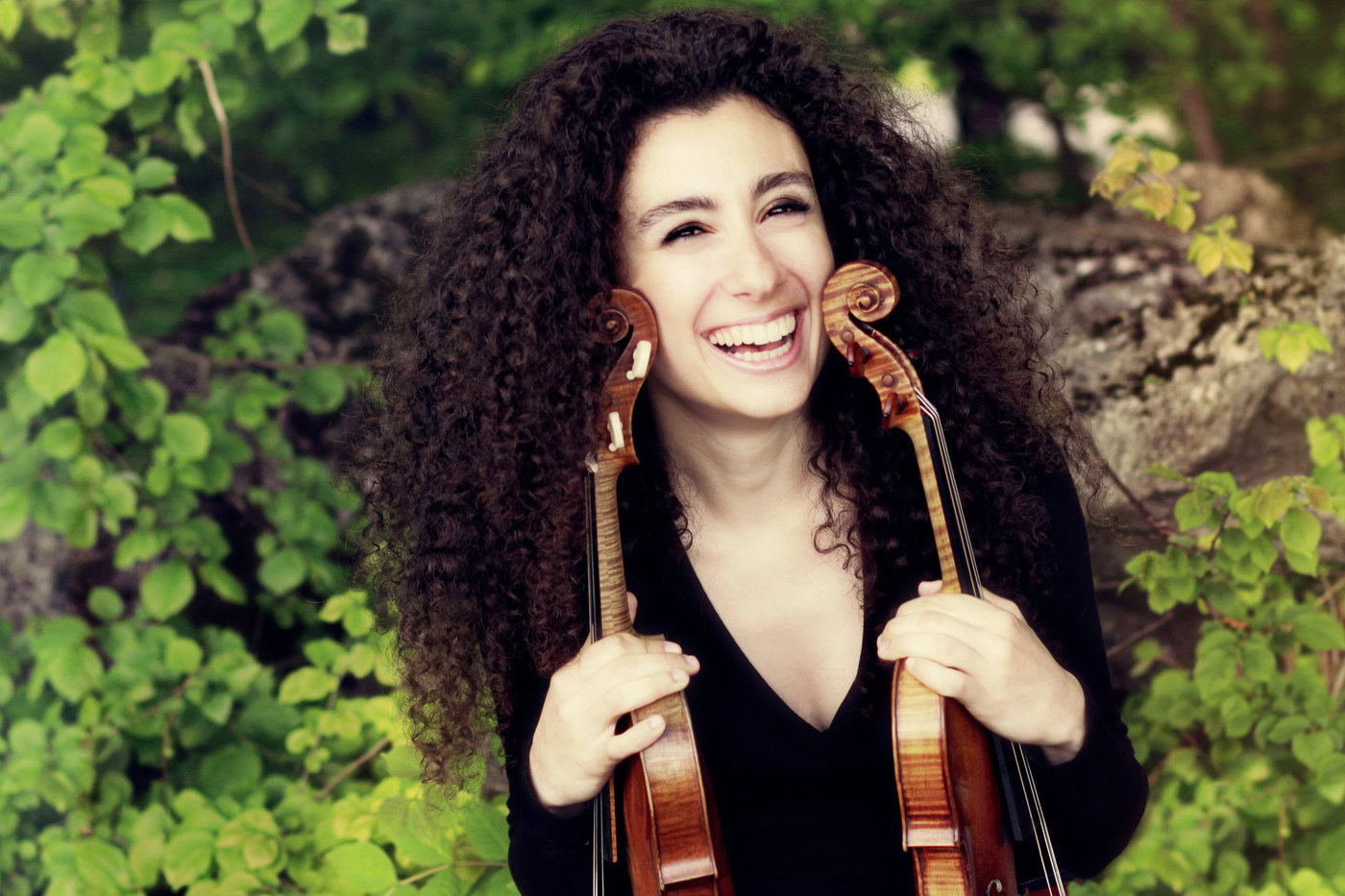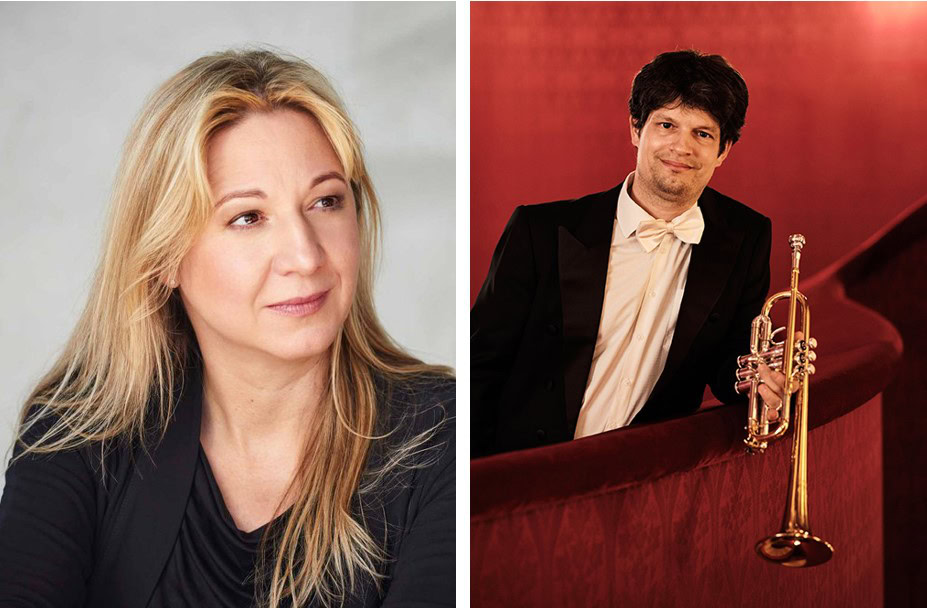Go to the springs and up the mountains
Chouchane Siranossian is one of the few violinists who switch naturally between a baroque instrument and a modern violin. A conversation about her life in Switzerland and Armenian music.

Chouchane Siranossian, You are at this year's Lake Constance Festival (April 27 to May 20) Artist in Residence. What is your relationship to this area?
I lived near Lake Constance for two years when I was concertmaster of the St. Gallen Symphony Orchestra. I have very fond memories of a boat trip with my grandparents. And I often went mountain climbing on the Säntis.
You play baroque violin on your most recent albums, then Mendelssohn on a modern instrument in the upcoming opening concert in Friedrichshafen. Isn't this change difficult?
No. At the solo recital in the Münsterlingen monastery church, I even play both instruments in one concert. They are different worlds that I like to move back and forth between. The baroque instrument has gut strings and is tuned differently. The bows are also different, of course. In the Baroque period, musicians often played different instruments.
You completed your soloist diploma in modern violin with Zakhar Bron in Zurich. Afterwards, at the age of 23, you were the youngest member of the St. Gallen Symphony Orchestra as concertmaster. What was that time like for you?
I have learned a lot - musically, but above all as a person. You have a lot of responsibility in this position. You are the link between the orchestra and the conductor. Now I conduct many orchestras from the violin.
Were you accepted by the orchestra straight away?
It wasn't easy at the beginning as a young woman and a foreigner at that. For me, it was always about the music. But every orchestra is a microcosm that you have to get to know. I really learned how to deal with people. I always tried to motivate everyone to give their best.
You gave up your permanent position to study early music again with Reinhard Goebel at the Mozarteum in Salzburg.
David Stern, the chief conductor in St. Gallen at the time, recommended him to me because I asked a lot of questions about the music. And also questioned myself. When I got to know Reinhard Goebel, I was immediately fascinated by his enormous knowledge of early music. In my first year with him, I only read books and studied manuscripts before picking up the violin again. This intensive research not only had a great influence on my music-making with the baroque violin, but also on every one of my interpretations.
What did you learn from him?
Everything (laughs). Thanks to him, I understood that there are big differences between modern violin playing and historically informed violin playing. The expression in early music is done much more with the right hand, i.e. with the bow stroke. I learned to ask the right questions and always go to the source - the autograph or the first print.
What do you prefer to play? Baroque violin or modern violin?
I can't say. If you ask me whether I'm French, Armenian or Swiss, I can't say that either. I am all three. It's similar with the violin. I particularly enjoy playing Italian baroque music. But it's the change that appeals to me.
You were born in Lyon, have Armenian ancestors and have lived in Switzerland for a long time. Where is your home?
I've lived in Switzerland for twenty years. I was often there as a child because I had lessons with Tibor Varga in Sion. Switzerland is the center of my life, even though I am often in France and occasionally in Armenia.
What role does Armenian music play in your life?
Armenian music was always present. My father is also a musician and a specialist in Armenian music. My grandparents often sang Armenian songs. Armenian culture is endangered - not only by the Turkish genocide in 1915, but also currently in Nagorno-Karabakh, where Armenians have been expelled by the occupying power Azerbaijan. They also want to wipe out our culture, but they cannot destroy our music. That is why it is important to cultivate this music and make it public.
What characterizes Armenian music?
Armenia was the first country to become officially Christian in the year 301. Religious music therefore plays a major role. Folk music is also very important. The composer Komitas wrote a lot of it down before he went mad because of the genocide he had to experience. Armenia has always been a bridge between Europe and the Orient - you can hear that too.
On your website, you can be seen in an evening dress with a violin in your hand on a mountain peak. Is the photo real or a montage?
Real, of course. Mountaineering is a great passion of mine. I've also played the violin on Mont Blanc. In 2020, I was still on the Matterhorn before I got pregnant for the first time.
What do you like about mountaineering?
Freedom. The contact with nature. In the mountains you are away from the noise, away from people. I really enjoy this silence. Mountaineering is also a kind of meditation for me - back to my roots. With two small children, I still have to do without it, but one day I'll be able to take them into the mountains with me. And they're already in my rucksack for smaller tours.
What connections do you see between playing the violin and mountaineering?
When I spend hours out in nature, I get the best musical ideas. This fresh air is simply good for me. Being alone in nature really is a great inspiration for me. Music also always means telling a story. After a mountain hike, I have a lot of new energy in my soul - that's good for my music-making.
You also give concerts with your sister, the cellist Astrig Siranossian. Is it easier or more difficult to play with your sister?
Both. It's easier because we know each other so well and complement each other wonderfully. But we are also each other's biggest critics and are particularly strict with each other in rehearsals.
What does family mean to you?
Everything. I can go on stage today because I have my family to support me. I'm always on the road with my two children. I also grew up with a very large family. When we have a family party, there are quickly over a hundred of us.








